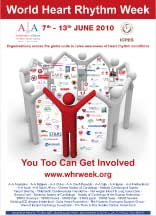
At Heart Rhythm 2010, there was an update on the results of the STOP AF (Sustained Treatment of Paroxysmal Atrial Fibrillation) clinical trial that involved patients who received cryoablation using the Arctic Front® Cardiac CryoAblation Catheter System. At twelve months following these procedures, these younger, highly-symptomatic patients had better quality of life and dramatically decreased …
Read More

